 DISCUSSION: What is a work? John Dante Prevedini leads a discussion about The performing artist as co-creator, including contributions from Halida Dinova, Yekaterina Lebedeva, Béla Hartmann, David Arditti and Stephen Francis Vasta.
DISCUSSION: What is a work? John Dante Prevedini leads a discussion about The performing artist as co-creator, including contributions from Halida Dinova, Yekaterina Lebedeva, Béla Hartmann, David Arditti and Stephen Francis Vasta.
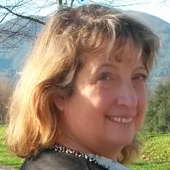 ASK ALICE: Weekly, from 2003 until 2016/17, Alice McVeigh took on the role of classical music's agony aunt to answer questions on a surprising variety of subjects.
ASK ALICE: Weekly, from 2003 until 2016/17, Alice McVeigh took on the role of classical music's agony aunt to answer questions on a surprising variety of subjects.
- Daniel Pelton Collective
- Gerald Moore
- David Bedford
- Georgia
- Gloria DeVidas Kirchheimer
- Malcolm Sargent
- Liszt: Mephisto Waltz No 1
- Oswald Spengler
Visits to the Doctor
RON BIERMAN appreciates music by John Adams, Mozart and Rachmaninov from Ingrid Fliter, Edo de Waart and the San Diego Symphony
Edo de Waart is now in his fourth year as Principal Guest Conductor of the San Diego Symphony. In his long career he's headed orchestras on four continents and taught in this country's finest music schools. It's no coincidence that his frequent conducting appearances in San Diego have coincided with the orchestra's tremendous improvement in quality. De Waart knows what he's doing in everything from Bach to his latest recording, a mystically moody contemporary symphony by Wim Henderickx. No wonder then that he chose works from three different eras for his most recent San Diego concert: The Chairman Dances (Foxtrot for Orchestra) by John Adams, Mozart's 23rd piano concerto, and Rachmaninoff's 2nd symphony.
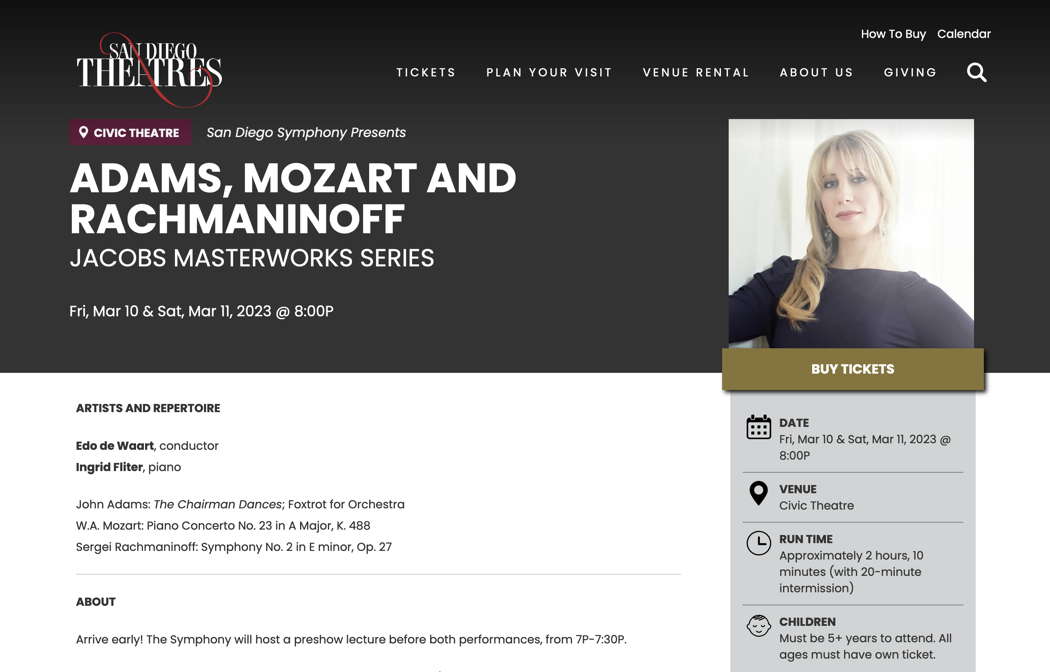
Online publicity for the San Diego Symphony's concerts on 10 and 11 March 2023 at San Diego Civic Theatre, featuring Ingrid Fliter
De Waart has had a role in the premiere of many Adams works and championed them with additional performances. This one was written earlier in the composer's career when he was more clearly tagged as a minimalist. It chugs along with vigorous rhythmic determination and the usual extended repetition, influenced by pure minimalists such as Steve Reich and Philip Glass. Eventually the lack of melodic interest becomes monotonous, despite variations in rhythmic accents and orchestration. Relief, or a break in the hypnotic spell for the receptive, arrives with the first of two dreamy melodic foxtrot interludes with almost Viennese charm. The piece was at its best with these musicians under de Waart's baton, hectically colorful while chugging along and with a touch of sly humor in the contrasting dance interludes.
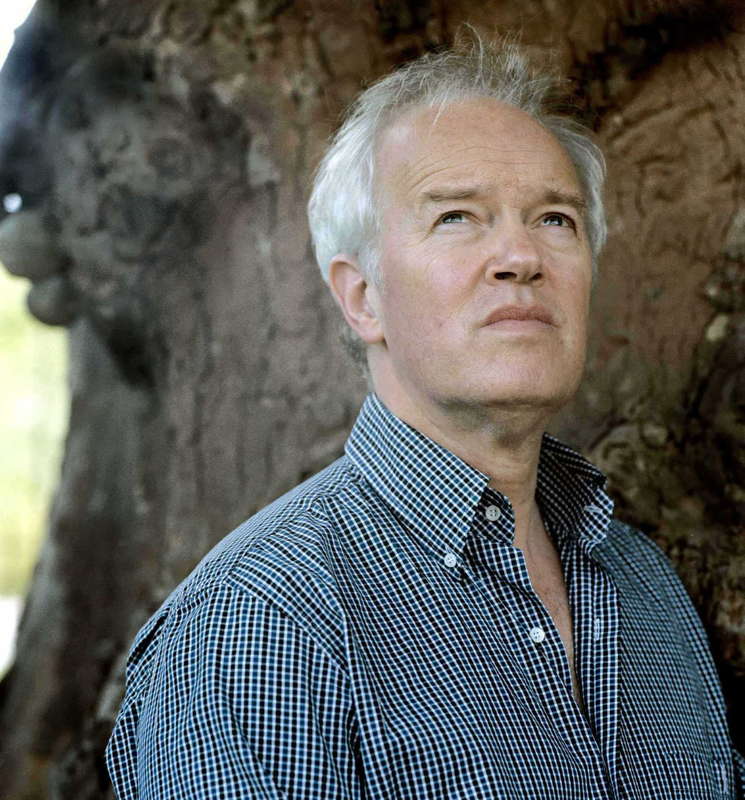
Edo de Waart
Mozart's 23rd piano concerto is my favorite of his twenty-seven, full of life, humor and melodies that produce emotions from beauty-induced tears to ebullient happiness. (Since some may need a more authoritative opinion, it was a favorite of Mozart's as well.) Argentine pianist Ingrid Fliter's performance was competitive with the best recorded versions by pianists such as Murray Perahia and Mitsuko Uchida.

Ingrid Fliter. Photo © Gary Houlder
The work's many difficult rapid runs were dispatched with delightful liquid clarity. Fliter's playfully teasing approach to the start of a few repeats in the rondo third movement worked beautifully. I don't remember another pianist playing it quite the same way. De Waart and the orchestra skillfully reinforced both the concerto's beauty and its joy. In his usual enlightening and clever pre-concert remarks, Nuvi Mehta suggested a visit to the doctor if the third movement doesn't make you smile.
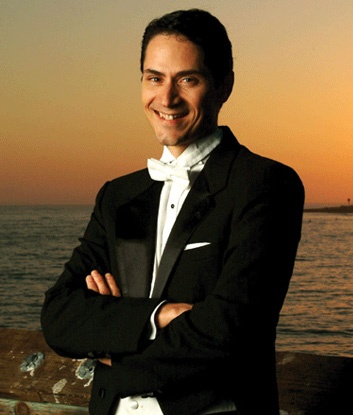
Nuvi Mehta
Rachmaninoff's symphonies have created giant differences of opinion. The St Petersburg premiere of the first in 1897 was a total failure, so much so that it contributed to his depression of three years. There wasn't a second performance until a year after Rachmaninoff's death in 1943. It's since been performed and recorded many times. Rachmaninoff famously recovered from his depression with the help of hypnotherapist Dr Nikolai Dahl, and subsequently dedicated his wildly successful second piano concerto to him.
The St Petersburg premiere of the second symphony was a success, but the work is such an extreme example of continuously spectacular romantic melody that it has fallen in and out of critical favor. Hostile writers have called it shallow, too long, and no better than movie music (as if that were necessarily an insult). But audiences never seemed to agree, and it's been back in critical favor since toward the end of the last century. In this case I fall into the audience category. It captured me the first time I heard it on a lo-fi AM car radio many years ago. The favorite among my more than half a dozen CDs and downloads is the first of two by the late André Previn and the London Philharmonic.
Maestro de Waart and the San Diego Symphony finished the evening with a performance I'd happily add to my collection. Well-judged climaxes climbed to thrilling peaks of shining brass and thundering percussion. Lush melodies in the strings swelled with warmth. The gorgeous adagio theme that became the pop tune 'Never Gonna Fall in Love Again' was rich and full. The maestro's first call for a bow went to Principal Sheryl Renk for the aching beauty of the clarinet solo that followed.
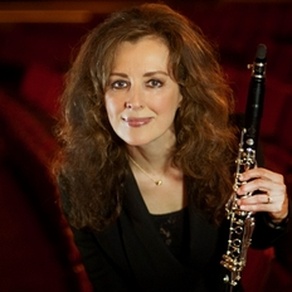
Sheryl Renk
It was a well-played program of minimalism followed by a contrasting feast of melodic genius, and the audience sprang to an immediate well-deserved standing ovation as the final notes faded away.
Copyright © 17 March 2023
Ron Bierman,
San Diego, USA



